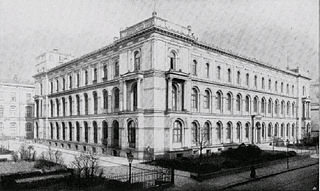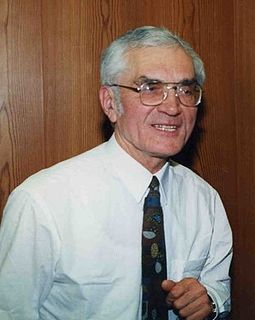
The Berlin-Brandenburg capital region is one of the most prolific centers of higher education and research in the world. It is the largest concentration of universities and colleges in Germany. The city has four public research universities and 27 private, professional and technical colleges (Hochschulen), offering a wide range of disciplines. Access to the German university system is tuition free.

The Berlin School of Library and Information Science at Humboldt Universität zu Berlin offers study programmes at three levels: bachelors, masters, and doctoral. It is the only institute in Germany with a doctoral programme and the right to award doctorates. Research methods are also an integral part of the pre-doctoral curriculum.

Horst Bredekamp is a German art historian.

Peter-André Alt is a German literary scholar, former president of the Freie Universitaet of Berlin and, since August 2018, president of the German Rectors' Conference (HRK). Alt is married to the writer Sabine Alt and has two adult sons

Michael S. Seadle is an information scientist and historian. He is professor for digital libraries at the Berlin School of Library and Information Science at Humboldt-Universitaet zu Berlin. He was Chair of the iSchools from 2014 to 2016. In 2017 he became the Executive Director with a term until March 2020. In 2016 he became one of the founders of the Humboldt-Elsevier Advanced Data and Text Centre at Humboldt-Universität zu Berlin.
Wolfram Adolphi is a German journalist and political scientist. From 1990 until the 1991 revelation that he had been an informant for the Stasi, he was head of the Berlin chapter of the Party of Democratic Socialism (PDS), which was a forerunner to the current Left Party.

The Agricultural University of Berlin was an agricultural university in Berlin, Germany. Established in 1881, it was closed in 1934, and incorporated as a faculty into the Humboldt University of Berlin.
Andreas Herbst is a German historian. His career has been divided between authorship and museum work. He has written extensively on aspects of the German Democratic Republic and since 2001 has worked for the German Resistance Memorial Center in Berlin.
Dr. Otto Peters is the Founding Rector and professor emeritus at the FernUniversität in Hagen, Germany. He has made contributions to the conceptual development of distance education. His main theory was called The Industrial Model. In this monograph "Distance education and industrial production: a comparative interpretation in outline" (1967) he described distance education as the most industrialized form of teaching and learning. He incorporated business management terms to show the industrial characteristics of distance education such as division of labour, assembly line, mass production and planning.
Sabine Funke is a German painter who lives and works since 1987 in Karlsruhe.

Content in this edit is translated from the existing German Wikipedia article at de:Michael Roth (Kybernetiker); see its history for attribution.

Open access to scholarly communication in Germany has evolved rapidly since the early 2000s. Publishers Beilstein-Institut, Copernicus Publications, De Gruyter, Knowledge Unlatched, Leibniz Institute for Psychology Information, ScienceOpen, Springer Nature, and Universitätsverlag Göttingen belong to the international Open Access Scholarly Publishers Association.

Alfons Rissberger is a German entrepreneur, business consultant, and author.

Wolfgang Händler was a German mathematician, pioneering computer scientist and professor at Leibniz University Hannover and University of Erlangen–Nuremberg known for his work on automata theory, parallel computing, artificial intelligence, man-machine interfaces and computer graphics.

Friedrich Bachmann was a German mathematician who specialised in geometry and group theory.
Dirk Alvermann is a German historian and archivist.
Hermann Danuser is a Swiss-German musicologist.
Paul Louis Riebesell was a German mathematician, statistician, actuary, and president of Hamburger Feuerkasse. At the International Congress of Mathematicians, he was an invited speaker in 1932 in Zürich and in 1936 in Oslo.
Peter Baumgart is a German historian.
Regina Scheer is a German writer and historian.











